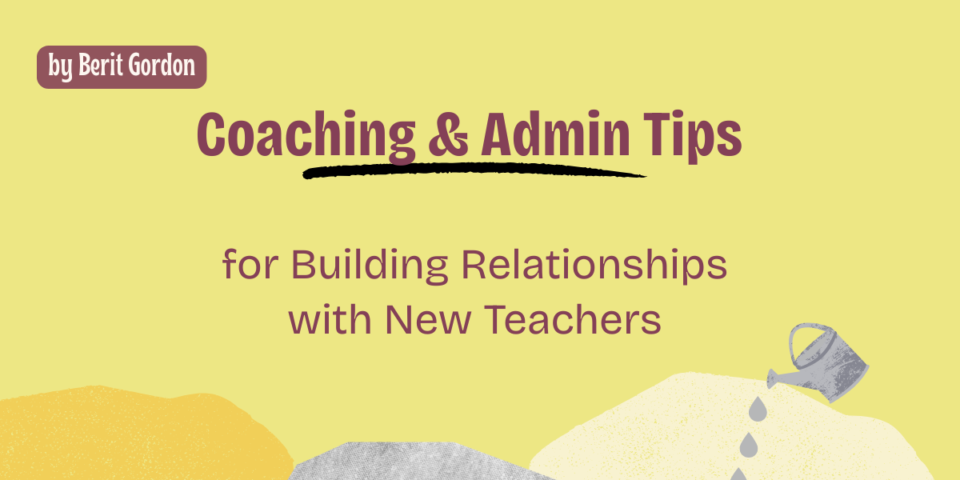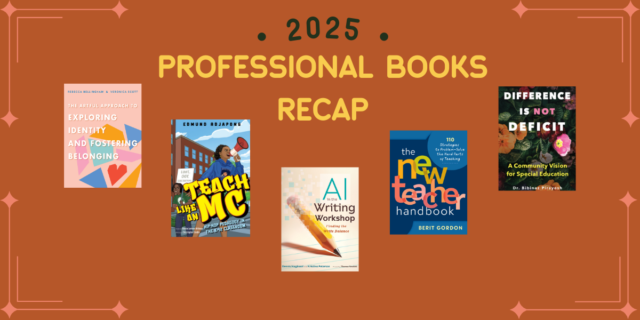
The following is adapted from The New Teacher Handbook by Berit Gordon. This is a very condensed list—ideas for coaches and administrators accompany all 110 strategies throughout the book. See part one on management ideas here.
Building Community
- Introduce yourself to new teachers as a professional and as a human being by sharing a bit about yourself and giving them time to do the same. Try to include something vulnerable or different about yourself to set a tone of empathy.
- Find out what your teachers’ hobbies are. If they don’t have one, encourage them to find something easy that’s related to their interests. Ask about it and celebrate their results.
- Ask your new teachers about their favorite artists, social media apps, shows, local restaurants, video games, and more. You might check out their favorite TV series, order lunch from that takeout spot, or download that popular app. Don’t pretend you get everything about it or try to fit in. Just show you value what interests them outside of their teaching life. Often, those interests make them better teachers!
- Create brief opportunities to chat by stopping by their room during transitions or lunch or showing up to staff meetings early. First, ask if they have a minute, and clarify they can say no! Ask, “Do you have any ideas about [helping a student who is often absent/showcasing student work/creating connections with caregivers]?”
- List your new teachers’ names. Can you say three things about each that don’t relate to their job performance? If not, seek these people out and listen to them.
- Share appropriate insider knowledge of personalities and communication styles. For example, maybe you know the principal’s gruff speaking style is partly to protect teachers from long meetings. Maybe you (or others) care greatly about promptness at meetings, or detailed lessons. These values should be shared publicly, but often subtle expectations go unsaid. Let everyone, especially new teachers, in on these unwritten rules of a successful relationship with you and the school.
Supporting Well Being
- Play matchmaker! Be intentional in pairing people up at staff meetings. If you can’t provide a regular mentor or coach, offer coverage to successful teachers so they can visit new teachers during their preps to chat. Who might be open to a connection? Introduce new teachers to others with some information to help personalize them outside of just being new.
- Start meetings by asking what has gone well or what the new teacher tried. If they follow up with what didn’t happen gently nudge them to stick with the positive for a bit longer. A common and not-so-healthy focus on deficits isn’t what we want for students or ourselves.
- What are the delightful things your new teachers have done and said recently? Share them as much as possible. Make it a goal to notice one positive thing every time you interact with new teachers, and tell them. We all learn by hearing what’s working; new teachers need it a lot!
- Reframe negative thoughts. Come up with a mantra together. Write it on several sticky notes and place them in easy-to-see places. Embrace fear of failure as normal.
- Check with your new teachers before absences happen. Ask what can be taken off their plate if they’re at wit’s end. Make a plan for how to get through tomorrow. If you notice a new teacher doing the bare minimum, ask them how they’re doing before blaming them.
- If they are in survival mode or at a breaking point, thank them for showing up for students. If they are willing, go on the teacher’s health insurance portal together.
- Help the teacher choose and write down a soothing reminder. You might suggest one like, this is not an emergency. Hearing you say it will help grant permission to the new teacher to be kind to themselves.
- Help new teachers practice specific actions to take if and when they are triggered or highly frustrated. Have self-regulating tips ready to choose from. Practice them together. Applaud if they admit any breakdown of composure.
- Visit class when the teacher tends to see the most undesired behaviors. Create a list of positive behaviors you noticed and share it. Switch and teach the next part, and ask them to observe and do the same.
Working with Families & Caregivers
- Reflect on how your own family related to the teachers you had growing up. Ask teachers to do the same—what did their families do to support their education that may have gone unseen by teachers? This history may reveal how we all fall prey to misconceptions. This can help us consider ways we may not know the whole story and avoid making assumptions.
- Let the new teacher vent if the caregiver’s communication feels unjust. Give space for that before trying to compose the reply. Share a time when you were on the receiving end of an upset call or email so they feel less alone. Then, draft the response together. Focus on naming how the caregiver feels and then offering a way forward. Remind the new teacher that acknowledging the caregiver’s feelings is not the same as agreeing with them.
- Share if there are newsletter templates, upcoming back-to-school nights, or options like paid coverage to assist with dismissal or drop-off or other times when teachers can easily introduce themselves and connect with families.
- Help them understand your school community by reviewing general data about what countries are represented, what languages are spoken, different ways families often participate in students’ school life, and more. However, be wary of any information that could contribute to negative stereotypes. Socioeconomic data, for example, may be relevant, but only if there is a nuanced understanding and respect for all walks of life and how families contribute to their children’s upbringing.



